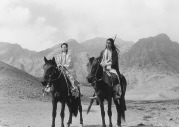|
Wolfram |
| Search |

Musa the Warrior is an epic saga of a Korean diplomatic delegation stranded deep in China in the 13th century, and about their eventful journey home. Hundreds of actors wear splendid authentic looking costumes, and entire villages and forts are recreated to reenact how it might have been during the early Ming Dynasty. The film is very well made and features spectacular views of 10,000 miles of the Chinese landscapes in colorful wide screen cinemascope.
Musa the Warrior is born a slave, loyal to his master, he becomes free. The film questions status. It addresses class distinctions. Circumstances make the general and the princess less than or equal to the slave and the old sergeant. In the end, regardless of class, the charactures develop a mutual respect for each other.
The blood factor is high -- extremely high. Ample severed limbs, heads, and miscellaneous other slices, gouges, and gore litter themselves all over the many battle scenes in the film. The confusion that one would expect in a battle is recreated for the audience by cutting the film with thousands of edits and by cutting the actors with countless scars.
In spite of all the blood, and did I mention that there as a LOT of blood, the fighting appeared realistic and not unbelievable. That is, people died quickly, as one would expect, and there were no long sword fights where a single hero fends off 20 warriors with a single jump kick. The fight scenes were not drawn out for dramatic effect. Often death happened suddenly and bluntly.
Honor, bravery, and extreme acts of courage are demonstrated by the Korean delegation and by their foes. This mutual respect which the film makers show of the Koreans and of their enemies is prevalent throughout this movie. At one point, one of the charactures admits a kinship between the Koreans and the Hans (Hans are the majority ethnic group in China, not to be confused with the Huns, who were nomadic warriors.) This mutual respect between enemies is a very gracious trait, one that may be lacking when watching similar films made in the West.
At times, the entire tone of the movie becomes too self congratulatory, however, as if it were a propaganda film from the Korean Department of History and Culture. At times the scenes are over acted and melodramatic. But overall, the film offers such mythical and splendid visions of the past, that these little affections are easily overlooked in the same way that it's easy to over look how heroic John Wayne was, for instance, in Tie A Yellow Ribbon.
In some ways, the film did resembles the cowboy and indian genera, where a small band of good guys are chased and surrounded by a large group of bad guys -- except in Musa the Warrior, the calvary never comes.
Instead, the needless and sometimes illogical massacre of the good guys, one by one, took the film to a different place. The climatic scene is a slow motion montage fight scene in a fortress on fire, with snow, a princesses, blood, love, sand, wind and ample honorable death. What else do you need?
Credits:
Country: South Korea
Year: 2001
Run Time: 153 minutes
Cast: Zhang Ziyi, Jung Woo-Sung, Ahn Sung-Ki, Joo Jin-Mo
Producer: Cho Min-Hwan, Zhang Xia
Editor: Kim Hyun
Cinematographer: Kim Hyung-Ku
Screenwriter: Kim Sung-Su
This Film Was Viewed at the 45th San Francisco International Film Festival